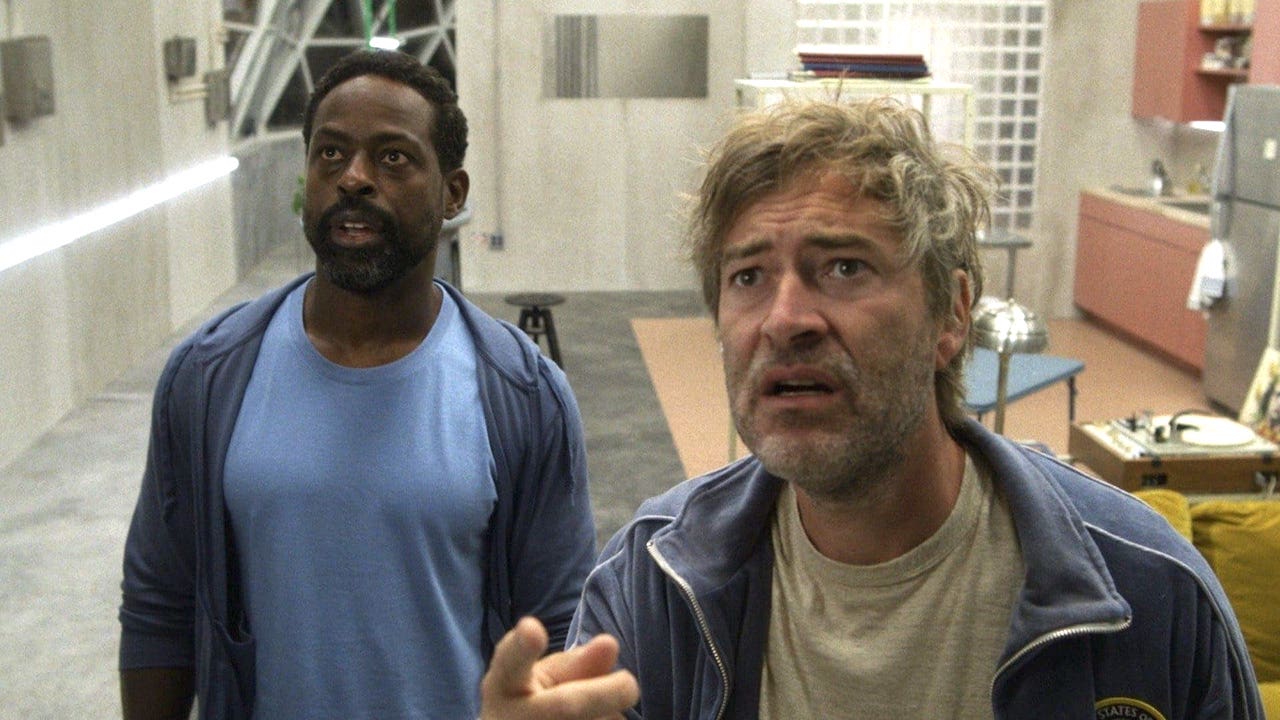Mumblecore gets apocalyptic in the bland and waffle-filled Biosphere

A high-concept apocalyptic premise exposes the limitations of Mark Duplass’s acting and his script’s dull banter, in sci-fi/buddy comedy Biosphere. Luke Buckmaster is unimpressed.
Oh good! A film about how, during times of ecological catastrophe, nature will magically restore itself. Just what people need during the climate crisis. “Life finds a way” is how Jeff Goldblum famously put it in Jurassic Park, a line referenced by the characters in Biosphere—who spend much of their time yakking about popular culture. Especially the ins and outs of the Super Mario Bros. universe. Even though in their world pop culture has essentially ended: Sterling K. Brown’s Ray and Mark Duplass’ Billy are the last two people on earth, which sounds like a drag, but they have a pretty good time chewing the fat, each appreciating the fact that they have a captive audience.
I’m still not sure what tone director Mel Eslyn (who co-wrote the script with Duplass) was going for. End of the world mumblecore? Apocalyptic Seinfeldia? Thanks to Ray and Billy’s penchant for endless blabber, the dialogue is pleasantly toned and flows like water from a broken main—but I didn’t dig the cut of their jib. They sound like bit characters from The Good Place, waffling on in a detached way, drawing from an inaccessible zeitgeist.
Early in the runtime, the last female fish in Ray and Bill’s pond dies, which spells trouble—given they rely on fish for sustenance. But not long later one of the animals appears to switch gender, changing from male to female because…life finds a way. A small green light also appears in the inky black sky above them.
Billy, we learn, used to be the President of the United States, which is borderline unbelievable: that nice man Mark Duplass would never wallow in the muck and mire of politics. Maybe dabble, but never wallow. Then it becomes completely unbelievable: we learn he was supposedly a Republican. Duplass + the GoP = chalk and cheese, fire and ice, diamonds and dust. That would never happen—in any reality, on any astral plain, in any corner of the cosmos.
Casting Duplass as a Republican president isn’t the most ridiculous part of Biosphere, given Eslyn latches onto an absurd central scenario (which I won’t go into) that in the hands of a less mannered artist might’ve led to offensive, soon-dated jokes, but in hers maintains a tone of good-natured cheekiness. However it does highlight Duplass’ limitations as an actor, and his unwillingness to change gears.

You’d think that acting as a former US president—inferred to have played a significant role in the world’s demise—would’ve shifted him into a dramatically different performative space. Instead it’s more or less the same old Duplass, bringing chatty-liberal-at-the-dinner-table vibes. A tad angstier than usual, but still the straitlaced guy, happy to meet his date’s mother on their first night out. Brown’s performance is slightly more palatable, coming admirably close to getting away with lines like “sometimes you can’t explain all the magic in the world.” But he’s supposed to be the scientist who built the biosphere—and I didn’t believe that for a moment either.
I found Ray and Billy both unbelievable and uninteresting. Despite their supposed political differences (Ray is a registered Democrat) they seem perfectly happy singing from the same ideological songsheet. Brown and Duplass have a comfortable chemistry that helps the film stay easygoing—but it’s a little too comfortable. Mention of their characters being childhood friends feels like a justification crowbarred into the script to explain their frictionless cameraderie. Even when they bicker and fight, you know their hearts aren’t in it. And neither was mine: if I was in that dome, I’d run outside and take my chances.



















